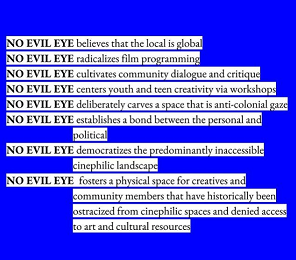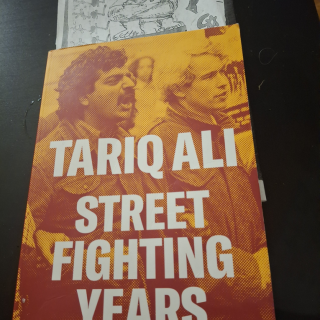Cinephiles and movie lovers are treated as passive and apolitical consumers in the profit driven commercial film industry. The new leftist, radical, and underground micro-cinema, NO EVIL EYE, offers audiences and artists in Columbus a politically charged space to nurture their love for the art of films. The personal is political. Art is personal and political.
Ingrid Raphaël and Rooney Elmi envisioned and materialized NO EVIL EYE. Ingrid is a video creator, archivist, educator and co-creator of GRID zine, a physical and digital zine highlighting the stories and experiences of black, brown, indigenous, people of color, immigrants and refugees living in the US. Rooney Elmi is a writer, programmer, and editor-in-chief of SVLLY(wood), an annual print and digital movie magazine geared toward curating a radical cinephilia. Their manifesto highlights their belief in bridging their leftist politics of anti-colonialism, internationalism, and solidarity with art.
“We both witnessed a void for an independent, radical space in Columbus that centered film screenings, critique, and activation. We thought, what would that space look, feel, and be like? And so we drafted up our manifesto and NO EVIL EYE came to life,” said Raphaël. “We want to cultivate a space that is intentional to make space for folks who have been historically and structurally been ostracized by the cinephilic culture and scene. Making our workshops and programming accessible is a priority. With that, we curate and program with a radical approach: by bridging the political and the personal to challenge the paradigms of how we interact with film.”
On May 9, NO EVIL EYE had its launch at Wexner Center for the Arts. On May 18, the micro-cinema held a meet up at Spacebar. Then launched its screenwriting series on May 25 and the final installment is on Saturday. Currently they’ve issued a call for short film submissions from the Midwest for their travelling program. Elmi explains the purpose of a democratizing micro-cinema and what they can offer separate from the corporate controlled content of commercial films.
“Microcinemas are typically known to be alternative spaces to view movies, what’s cool about microcinema in the contemporary context is that they’re spearheaded by programmers that can mix and match films from different filmmakers from different eras and aesthetics to tell a unified thematic narrative,” said Elmi. “With NO EVIL EYE we want to promote that microcinema ideal by establishing a realistic yet utopian vision of cinema as a space of socio-political possibilities through our programming, workshops, and being a community driven public theater space.”
As audiences are treated as products, NO EVIL EYE offers a relief from capitalist alienation. Uplifting local, marginalized voices is the future of art spaces. To support this space and for more information follow @noevileyecinema on twitter and instagram.




